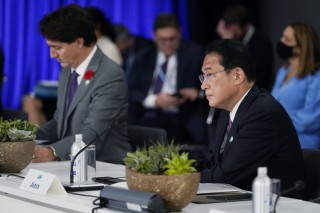Loading
Search
▼ Kishida's Debut On World Stage Offers Few Clues About His Foreign Policy
- Category:Other
Japanese Prime Minister Fumio Kishida on Tuesday made a smooth diplomatic debut at the U.N. climate talks in Britain, showing not only his commitment to issues of global importance but also networking with key countries that share concerns over China's assertiveness in the Indo-Pacific.
But the whirlwind trip has not done much to provide clarity over how Kishida, who is just weeks into Japan's top job, plans to deal with the foreign and national security challenges ahead -- from beefing up the U.S.-Japan alliance to managing the rise of China.
Kishida appeared to be satisfied with the outcome of his first overseas trip as prime minister, telling reporters he made Japan's "presence" felt through a speech that conveyed his resolve to lead efforts to put Asia on a path to a zero-carbon emission future and to curb his country's contributions.
Having long served as a foreign minister, he also said he made a "very good start" in face-to-face diplomacy, touching on the brief conversation he had with U.S. President Joe Biden and talks held with British Prime Minister Boris Johnson, Australian Prime Minister Scott Morrison and Vietnamese Prime Minister Pham Minh Chinh, among others.
Robert Ward, a London-based expert on Japan at the International Institute for Strategic Studies, noted that it was apparently difficult to achieve "much of substance" in Kishida's diplomatic debut, given he had only hours in the Scottish city of Glasgow in the immediate aftermath of Sunday's general election.
But he said Kishida showed "important symbolic political commitment" to the countries he had meetings with.
Britain has made a "tilt" to the Indo-Pacific, Australia is a member of the Quad group of four major Indo-Pacific democracies also involving the United States, Japan and India, and Vietnam is a country Japan hopes to work with to counter Beijing's assertive behavior in the East and South China seas.
While Kishida's moves underscore the continuation of Japan's diplomatic efforts to deepen the alliance with the United States and advance a "free and open Indo-Pacific," attention is increasingly being paid to the details of his foreign and security policy agendas.
"What remains to be seen is how a Kishida Cabinet will manage critical questions about the future of the alliance," Sheila Smith of the Council on Foreign Relations said in response to emailed questions, adding that among the "tough issues" will be determining what kind of investment is needed for Japan to maintain its defense capabilities and to prepare for a Taiwan contingency.
Although hailing from a historically dovish faction of Japan's ruling Liberal Democratic Party, Kishida has vowed to beef up Japan's defenses amid China's rapid military buildup and North Korea's nuclear and missile threats, while instructing his government to weigh the possibility of securing the capability to strike targets in a hostile country.
The LDP, of which Kishida is now president, also proposed ahead of the recent House of Representatives election a target of spending 2 percent of Japan's gross domestic product on defense, a substantial increase from the 1 percent threshold the country has traditionally maintained.
Acquiring enemy base strike capabilities has been a particularly politically sensitive topic in Japan in light of its war-renouncing Constitution that has led the Self-Defense Forces to adopt a so-called exclusively defense-oriented policy.
But it is also a matter of great interest to Washington and neighboring countries such as China as the move could mark a deviation from the nature of the decades-old alliance, in which the United States has served as a "spear" and Japan as the "shield."
As the United States continues to take a tough stance on China, Japan has become more vocal about its concerns over Taiwan, which Beijing considers a renegade province awaiting reunification, by force if necessary.
But Tokyo has not made clear what role it exactly plans to play.
"Is it going to just be defense of Japan? Is it going to be rear area support of U.S. forces?"
Jeffrey Hornung, a senior political scientist at the Rand Corporation, asked at a recent in-person event organized by the Heritage Foundation.
"There's a whole host of mission sets that I think Japan is capable of playing," he added.
Citing Japanese security legislation that provides the grounds to act in such cases, Hornung said, "The security legislation tells us what legally Japan is capable of doing. It does not tell us what Japan is willing to do. And that's really the $10,000 question here."
Whether Kishida likes it or not, expectations about Japan's role in maintaining security in the Indo-Pacific region are likely to become greater as the United States shifts its focus more to competing with China following its withdrawal from Afghanistan.
"Americans could fight the war on terror without Japan. But here in this Indo-Pacific region, Americans cannot fight without Japan, Americans cannot deter China without Yokosuka, Sasebo and Kadena and Okinawa (where U.S. bases are located)," Kuni Miyake, research director at the Canon Institute for Global Studies, a Tokyo-based think tank, said.
"This is the first time since 1945 (that) Japan has to be, whether we like it or not, a key player, because the theater is here, not in Europe, not in the Middle East anymore," he said at a recent online event organized by the Stimson Center in Washington.
Ward said Japan's allies would likely be feeling relieved that Kishida is off to a good start, including his smooth diplomatic debut and the LDP having a strong performance in Sunday's election, as they closely watch for signs of whether he could end up being another short-term prime minister.
"The start is good, but obviously, people's expectations would have been raised, I think, as well. So the important thing would now be to try to deliver on this," he said.
© KYODO
- November 3, 2021
- Comment (0)
- Trackback(0)


